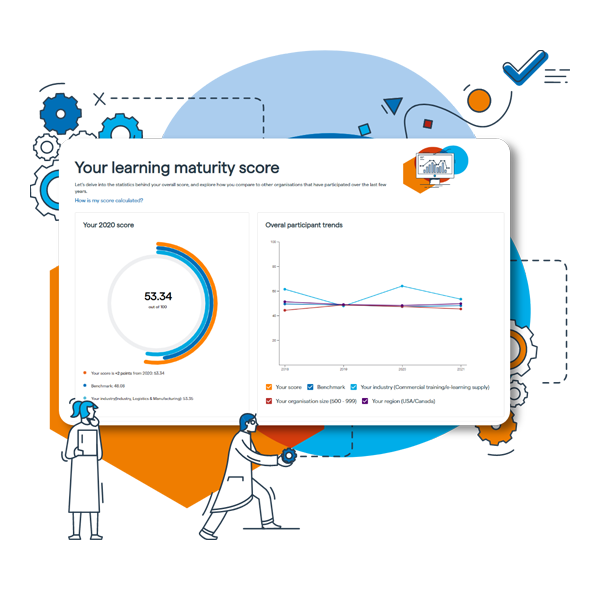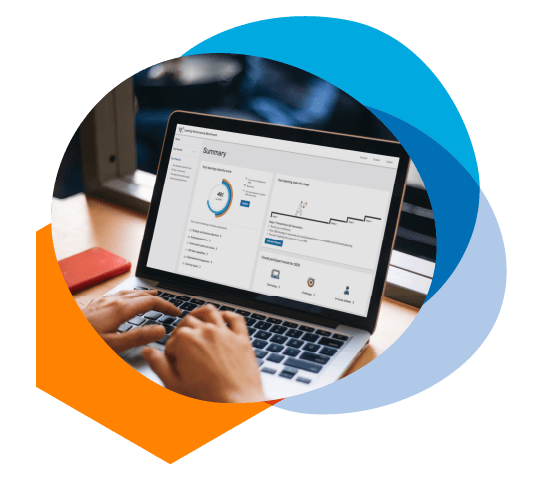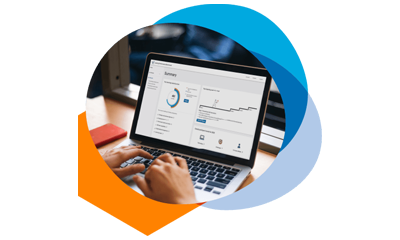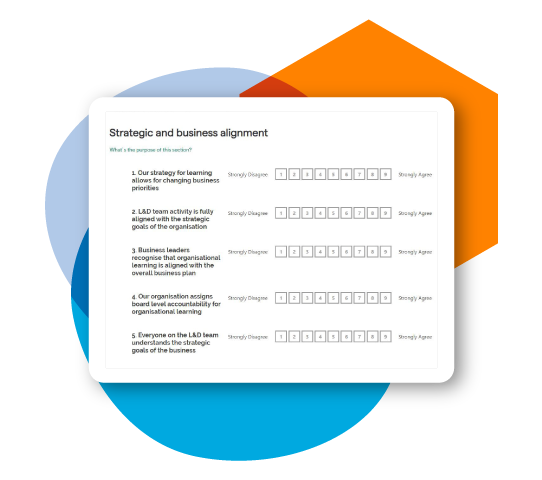What is the Learning Performance Benchmark?
The Learning Performance Benchmark helps you reflect on your current learning strategy, highlights areas of improvement and shows you how your organization compares to others. Whatever your starting point, our Learning Performance Benchmark analyzes where you are now, where you want to be and how to get there faster.
Why do the Benchmark?
The Benchmark helps you take the next step in becoming a high-performing learning organization. Ensuring your learning strategy is evidence-led and delivers real impact. Completing your Benchmark gives you access to your own personalized results dashboard. Through this, you can explore your organization’s learning strategy by focusing on culture, alignment, digitalization, strategy in practice, learning design and leadership.
We also recommend taking the Benchmark every year to help track your improvement and inform your learning strategy.
Who should take part in the Learning Performance Benchmark?
All learning professionals are encouraged to take part and make time to reflect on how learning helps their business. Especially those that are overseeing a team or department.
How much does it cost?
The Learning Performance Benchmark is free.
It’s the only free, independent and confidential benchmark available to learning and development professionals.
What does the review cover?
We first ask for demographic information such as: organization size, geographic spread and industry. This enables us to build your personalized results and means we can accurately benchmark your L&D strategy against organizations similar to you.
It is then divided into four parts exploring: vision, resources and impact; strategy in practice and culture; technology, tools and access and finally looking at challenges preventing you from getting the most out of your L&D strategy.
How does it work?
There are two main sections. Firstly, a four-part review. Giving you time to reflect on your strategy, shed light on any gaps and identify opportunities for the future.
Then, when your review is complete, you’ll get instant personalized results showing your learning maturity score. As well as clear benchmarks of where your results sit against your peers.
How long does the review take to complete?
Roughly 60 minutes.
Does the review have to be completed in one sitting?
No, participants can save their progress and complete it later.
What data can I expect to see in my results?
A clear, dashboard break-down displaying your learning maturity score, learning maturity stage, six key components (Strategic and business alignment, Employee experience, Environment, Talent and culture, L&D team capabilities, Organizational engagement and Learning impact) and overall benchmark participant trends.
Each page includes interactive graphs with the ability to filter by industry, region, and organization size. As well as insights on how to progress to higher maturity, including links to further reading.
How is my learning maturity score calculated?
Your score is an aggregate of 96 strategic behaviors, measured on a scale of 1–100. It tracks the overall health of your organization's learning strategy, and establishes a baseline for the coming year. In this way, your score indicates not only the impact of your L&D strategy in practice, but also the extent of your digital innovation, and how well your organization is embedding behavioral change.
The learning maturity score has a positive relationship to the four strategic levers of business: Growth, Transformation, Productivity and Profitability.
Are review responses confidential?
All information you provide is anonymous and confidential. We recognize your contribution and treat your data with the respect and dignity it deserves.
What happens to my data?
Your data is stored in a GDPR-compliant UK database. It’s used exclusively for research purposes. You’ll have access to the aggregated data used to produce our reports. All information you provide is anonymous and confidential.
![]() WATCH DEMO
WATCH DEMO
![]() Download report
Download report














